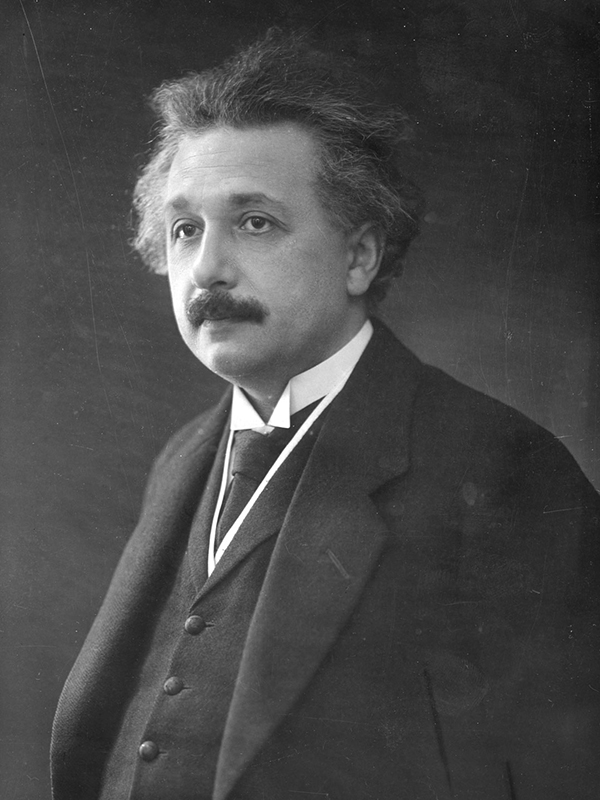Early Life:
Albert Einstein was born in Ulm, Württemberg, Germany on 14th March, 1879. His father was Hermann Einstein, a salesman and Engineer. His mother was Pauline Einstein. In 1880, the family moved to Munich, where his father founded Elektrotechnische Fabrik J. Einstein & Cie, a company that manufactured electrical equipment based on direct current.

Albert began his school career in Munich. In addition to his violin lessons, he also had religious education at home where he was taught Judaism. Although it has been thought that Einstein had early speech difficulties, he excelled at the first school that he attended. In 1891, he studiedmathematics, in particular, Calculus.
Otto Neugebauer, the historian of ancient mathematics, was told about the boy Einstein who he characterizes as a ‘legend’.
As he was a late talker, his parents were worried, but at last, at the supper table one night, he broke his silence to say, "The soup is too hot." Greatly relieved, his parents asked why he had never said a word before. Albert replied, "Because up to now everything was in order."
Albert Einstein's lifelong passion for physics was sparked at the age of four or five when his father showed him a small compass. Young Albert tried to imagine the mysterious force that caused the compass needle to move, and the experience awakened a sense of wonder that stayed with him for life. Understanding the universe became an ‘eternal riddle’ for Einstein, a quest for scientific enlightenment. "The road to this paradise was not as comfortable and alluring as the road to the religious paradise," he wrote, "but it has proved itself as trustworthy, and I have never regretted having chosen it."
"The important thing is to not stop questioning. Curiosity has its own reason for existing." – Albert Einstein
At Work:
One of Einstein's colleagues asked him for his telephone number one day. Einstein reached for a telephone directory and looked it up.
"You don't remember your own number?" the man asked, startled.
"No," Einstein answered. "Why should I memorize something I can so easily get from a book?"
In fact, Einstein claimed never to memorize anything which could be looked up in less than two minutes.
Researches & Achievements:
He was appointed as a professor at the Karl-Ferdinand University in Prague in 1911. In fact 1911 was a very significant year for Einstein since he was able to make preliminary predictions about how a ray of light from a distant star, passing near the Sun, would appear to be bent slightly, in the direction of the Sun due to the Sun’s gravity. His work was found to be confirmed by other scientists thus, media reports of this event made Einstein world famous.
The theory, which revolutionized our understanding of time and space, is based on Einstein's astonishing recognition that light always travels at a constant speed, regardless of how fast you're moving when you measure it. Einstein's explorations into the fundamental properties of light also laid the groundwork for his most impressive achievement, the General Theory of Relativity. He said “I have achieved everything in ‘The Theory of Relativity’ but as far as reality is concerned I have utterly failed!”
In 1921, Einstein was awarded the Nobel Prize in Physics for his explanation of the photoelectric effect.
In 1922, he travelled throughout Asia, as part of a six-month excursion and speaking tour. One day during a tour, Albert Einstein's driver, who often sat at the back of the hall during his lectures, remarked that he could probably give the lecture himself, having heard it so many times. Sure enough, at the next stop on the tour, Einstein and the driver switched places, with Einstein sitting at the back in his driver's uniform. Having delivered a flawless lecture, the driver was asked a difficult question by a member of the audience. "Well, the answer to that question is quite simple," he casually replied. "I bet my driver, sitting up at the back there, could answer it..."
Among further honors which Einstein received were The Copley Medal of the Royal Society in 1925 and the Gold Medal of the Royal Astronomical Society in 1926. Indeed Einstein's life had been hectic and he was to pay the price in 1928 with a physical collapse brought on through overwork. However he made a full recovery despite having to take things easy throughout 1928.
Conclusion:
He was A Legend, who from childhood had few characteristics of using speech whenever required, passionately curious, memorizing not required when you find things easily, his work ethics in physics says it all about this mesmerizing figure. We will have more insight into Einstein in next edition.